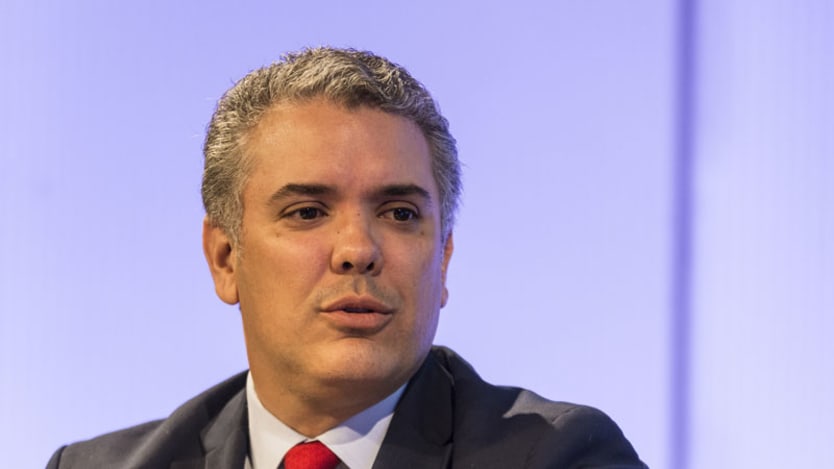
WASHINGTON — Colombia’s new president, Iván Duque, takes office today as hyperinflation in neighboring Venezuela is set this year to hit 1 million percent and thousands of people each day flee across the border from the worsening humanitarian crisis.
The outflow is so great that official numbers are difficult to come by, but it is estimated that about 1 million Venezuelans have come to Colombia in the past 16 months. Many analysts think that is likely a conservative estimate.
More on the Venezuelan crisis:
► Colombia aid groups under strain as Venezuela crisis spills over
► Colombia conducts census of Venezuelan refugees as crisis deepens
Juan Carlos Pinzón, who served as both Colombian minister of defense and ambassador to the United States during the administration of outgoing president Juan Manuel Santos, said Colombia’s response to the humanitarian crisis in Venezuela is further complicated by a host of other challenges the country is dealing with. He listed immigration, refugees, security, criminal bands, corruption, drug trafficking, illegal mining, and FARC and ELN — the acronyms for two of Colombia’s guerrilla groups — as issues Duque will face, some of these exacerbated by the situation in Venezuela.
Eric Farnsworth, vice president of the Council of the Americas, said the host country will be increasingly strained by the refugee population. Last year, the Colombian economy expanded at its slowest pace since the economic crisis, and the government still needs millions of dollars to address the explosion of illegal coca crop growth in the country over recent years.
“This is ultimately going to challenge him in office. [Duque] doesn’t have a lot of extra money lying around. Refugee populations and humanitarian crises require a lot of resources to deal with, but at the same time Duque needs the limited resources that exist for things including the implementation of peace accords and integration of the former FARC. He’s going to have to increase the narcotics control budget,” Farnsworth said.
“The last thing he needs is a humanitarian crisis … that’s going to require millions of dollars just to address.”
Last month on a trip to the border, U.S. Agency for International Development Administrator Mark Green announced an additional $6 million in humanitarian assistance for Venezuelans in Colombia. The U.S. has given $56 million in humanitarian and development assistance for displaced Venezuelans since fiscal year 2017.
Fifty thousand people are expected to be crossing the border each day to meet their basic needs, although not all of those people intend to stay in Colombia and many move on to other countries. Some also cross the border for the day or a few days to earn money or access services, and then return to Venezuela.
Just before leaving office last week, Santos granted 440,000 Venezuelans in Colombia residency and work permits. This will allow people who are already in the country to work legally, helping to integrate them into the Colombian economy. Santos said it was a humanitarian gesture that will help Venezuelans who have seen their money and property become worthless and been forced to flee their homes to provide for their families, including those Colombians who had fled their country’s decades-long civil war for a life in oil-rich Venezuela.
Worsening economic conditions in Venezuela continue to drive people across the border to Colombia and Brazil. Eighty-five percent of basic medicines are unavailable, and 87 percent of the population has said it did not have enough money to buy food. Hyperinflation has wiped out people’s savings and increased the prices of basic goods such as flour, toilet paper, and medicine, making it increasingly difficult for people to meet their basic needs in Venezuela.
“There are two scenarios: One is that it will continue to get worse and the numbers will increase, and the other is that the numbers are going to stabilize at some point. It’s hard to figure it out. There’s no scenario which it is going to get better, that’s for sure,” said Dany Bahar, fellow at the Brookings Institution.
“In the next 16 months you could expect 2 million, 3 million people [to flee]. That’s a scenario in which things are going to get out of hand.”
But Bahar said those fleeing Venezuela can contribute positively to Colombia’s economy with the new work permits.
“Let’s remember that in this case, low income doesn’t necessarily mean unskilled. A lot of people who are migrating are professionals who were middle class,” Bahar said. “And now they’re very affected by the crisis, so even if they might not have capital with them they probably have a lot of human capital. So under the right policies I think that all these countries could really benefit from integrating these migrants into the labor force.”
Those who registered earlier this year in a census of Venezuelans conducted by Colombian authorities will receive the residency status and work papers. Farnsworth said he expected that because Santos made the decree so close to the end of his term that he had warned Duque the move was coming, but that Colombia may not be able to continue its hospitality indefinitely.
“At some point Colombia becomes saturated with Venezuelans,” Farnsworth said. “You can only absorb so many, no matter how big your heart is.”








